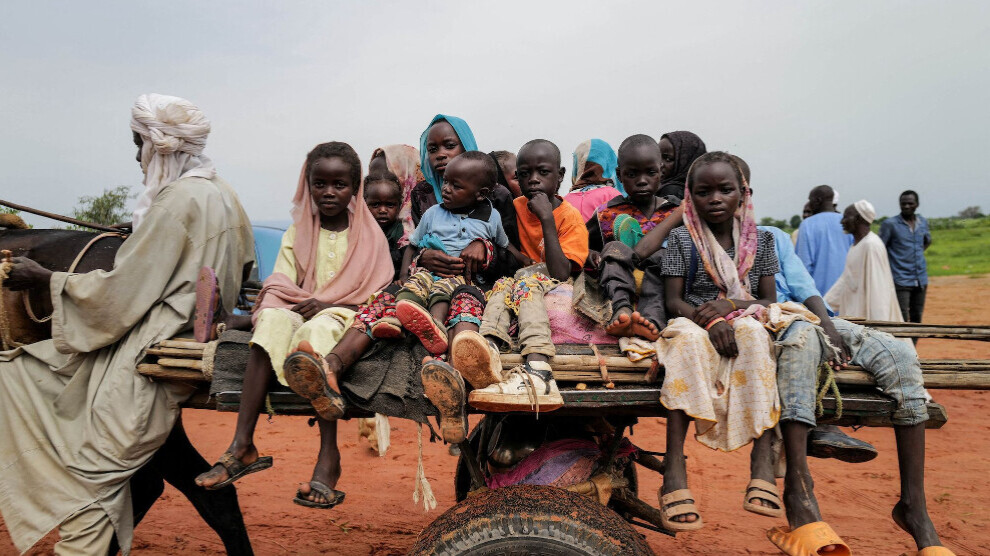Sudan: Ongoing Conflict and the Deteriorating Humanitarian and Health Situation
Human rights reports have confirmed that the humanitarian and health situation in Sudan has reached a critical stage amid severe food shortages and the spread of epidemics, in addition to widespread violations targeting Sudanese women in shelters.

News Center – With the increase in killings, kidnappings, and human rights violations, fears have grown that Sudan is becoming a dangerous environment threatening children and women. Even the shelters that are supposed to provide safety have turned into sources of psychological trauma and physical harm for their residents, while the overall humanitarian and health conditions have deteriorated to their worst levels.
The conflict in Sudan continues unabated. On Tuesday morning, October 14, the Rapid Support Forces (RSF) launched four suicide drone attacks on the Ad Babakr area in East Nile, Khartoum State, killing a father and his daughter and injuring another person. According to Sudanese media outlets, the drones targeted civilian homes.
106 Women Forcibly Deported from Khartoum
At the same time, Khartoum State witnessed a flagrant violation of Sudanese women’s rights, as authorities forcibly deported 106 women from the south to the border area of Wantou under dire humanitarian conditions. Among the deported were 61 women who were forced to leave their children behind in Khartoum, with no information available about their whereabouts or condition. This has sparked widespread concern about the fate of these children left behind in the Sudanese capital, alongside growing calls to respect the human rights of residents in the south—especially amid the country’s complex security and humanitarian crises.
In response, the governor ordered the seizure of the buses that carried out the deportations until the children are returned to their mothers. Some humanitarian organizations have provided emergency assistance to the deported women in an attempt to alleviate their suffering.
Since the escalation of conflict in Sudan in April 2023, approximately 52% of Sudanese women have been displaced, according to UN statistics. However, these figures do not specify the number of southern women who have been forcibly deported or displaced due to the ongoing conflict.
17 Children Killed in Attack on Displacement Center in El Fasher
While some children in the south remain separated from their families, others have faced death. UNICEF reported on Sunday, October 12, that an attack on a displacement center in El Fasher killed 17 children, including a 7-day-old infant. The organization emphasized that killing and injuring children constitutes a grave violation of their rights, and that targeting civilians in places meant to provide safety and refuge is “unthinkable.”
This is not the first time children in Sudan have suffered violations. Since the escalation of the crisis in 2023, around 2,000 children have faced various forms of violence—including killing, maiming, displacement, abduction, abuse, and forced recruitment—according to UN reports.
Furthermore, around 1,000 children were forcibly disappeared between 2023 and 2024, and approximately 3,000 children were killed, according to a report by Sudan’s National Council for Child Welfare in September 2024.
Shrinking Humanitarian Aid and the Spread of Disease
The UN Humanitarian Coordinator in Sudan confirmed that no relief shipments could currently be delivered to El Fasher due to ongoing fighting and blocked roads leading to the city. The conflict has resulted in the deaths of about 120 humanitarian workers since it began, reflecting the extreme risks faced by aid organizations operating in Sudan.
RSF attacks have also worsened the food crisis, forcing most community kitchens—once providing meager meals to trapped residents—to shut down due to the depletion of food supplies. Witnesses told Sudanese outlets that some residents have resorted to eating tree leaves and animal feed to survive.
Meanwhile, 15 confirmed cases of diphtheria—including three deaths within just three days—were recorded in the Al-Jarif East area of East Nile, Khartoum State. Experts have warned of an imminent epidemic. Dr. Adeeba Ibrahim Al-Sayed, a member of the Sudanese Doctors Syndicate and a specialist in internal medicine and epidemiology, said the disease is spreading rapidly, stressing that each hour of delay in response costs more lives.
She noted that the health situation has reached a dangerous stage, with a severe shortage of essential medicines. Life-saving drugs are now only available on the black market at prices far beyond patients’ reach, turning every infection into a recurring humanitarian tragedy. She urged authorities to declare Khartoum an epidemic zone. According to the Sudanese Ministry of Health, 409 cases of cholera have been recorded across several states, resulting in 13 deaths. The cases are directly linked to contaminated water and food, while most dengue fever cases have been reported in Khartoum State.
